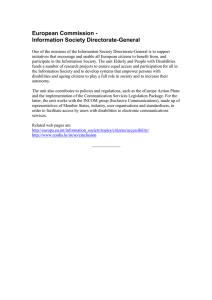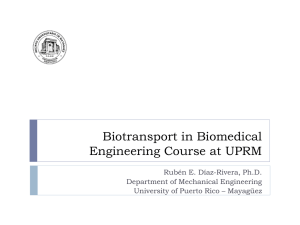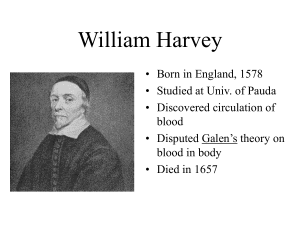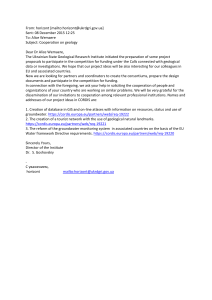CORDIS: Print document http://cordis.europa.eu/search/index.cfm
advertisement
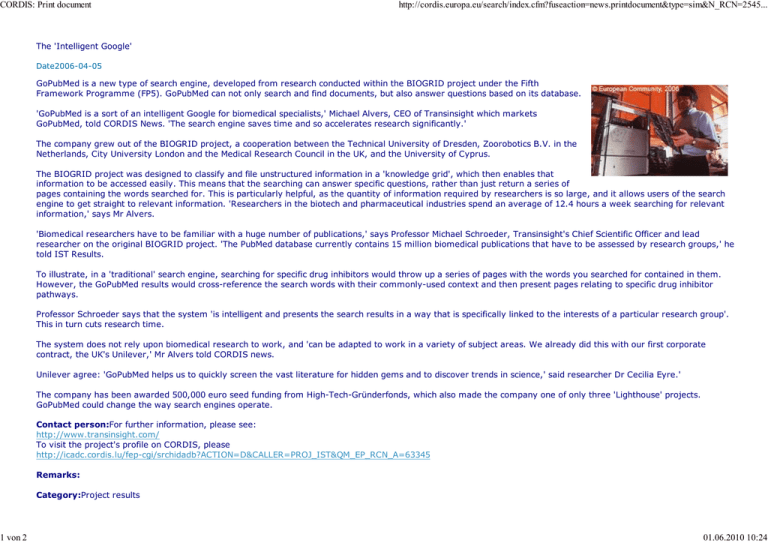
CORDIS: Print document http://cordis.europa.eu/search/index.cfm?fuseaction=news.printdocument&type=sim&N_RCN=2545... The 'Intelligent Google' Date2006-04-05 GoPubMed is a new type of search engine, developed from research conducted within the BIOGRID project under the Fifth Framework Programme (FP5). GoPubMed can not only search and find documents, but also answer questions based on its database. 'GoPubMed is a sort of an intelligent Google for biomedical specialists,' Michael Alvers, CEO of Transinsight which markets GoPubMed, told CORDIS News. 'The search engine saves time and so accelerates research significantly.' The company grew out of the BIOGRID project, a cooperation between the Technical University of Dresden, Zoorobotics B.V. in the Netherlands, City University London and the Medical Research Council in the UK, and the University of Cyprus. The BIOGRID project was designed to classify and file unstructured information in a 'knowledge grid', which then enables that information to be accessed easily. This means that the searching can answer specific questions, rather than just return a series of pages containing the words searched for. This is particularly helpful, as the quantity of information required by researchers is so large, and it allows users of the search engine to get straight to relevant information. 'Researchers in the biotech and pharmaceutical industries spend an average of 12.4 hours a week searching for relevant information,' says Mr Alvers. 'Biomedical researchers have to be familiar with a huge number of publications,' says Professor Michael Schroeder, Transinsight's Chief Scientific Officer and lead researcher on the original BIOGRID project. 'The PubMed database currently contains 15 million biomedical publications that have to be assessed by research groups,' he told IST Results. To illustrate, in a 'traditional' search engine, searching for specific drug inhibitors would throw up a series of pages with the words you searched for contained in them. However, the GoPubMed results would cross-reference the search words with their commonly-used context and then present pages relating to specific drug inhibitor pathways. Professor Schroeder says that the system 'is intelligent and presents the search results in a way that is specifically linked to the interests of a particular research group'. This in turn cuts research time. The system does not rely upon biomedical research to work, and 'can be adapted to work in a variety of subject areas. We already did this with our first corporate contract, the UK's Unilever,' Mr Alvers told CORDIS news. Unilever agree: 'GoPubMed helps us to quickly screen the vast literature for hidden gems and to discover trends in science,' said researcher Dr Cecilia Eyre.' The company has been awarded 500,000 euro seed funding from High-Tech-Gründerfonds, which also made the company one of only three 'Lighthouse' projects. GoPubMed could change the way search engines operate. Contact person:For further information, please see: http://www.transinsight.com/ To visit the project's profile on CORDIS, please http://icadc.cordis.lu/fep-cgi/srchidadb?ACTION=D&CALLER=PROJ_IST&QM_EP_RCN_A=63345 Remarks: Category:Project results 1 von 2 01.06.2010 10:24 CORDIS: Print document http://cordis.europa.eu/search/index.cfm?fuseaction=news.printdocument&type=sim&N_RCN=2545... Data Source Provider:Transinsight, IST Results Document of reference: Subject index:Biotechnology,Coordination, Cooperation,Medicine, Health,Reference Materials,Scientific Research Programme Acronym: IST , MS-D C Record control number (RCN):25450 2 von 2 01.06.2010 10:24
